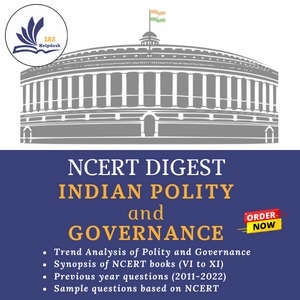SC verdict on Electoral Bonds: What is proportionality test?
Description
SC verdict on
Electoral Bonds: What is proportionality
test?
Description: Read about Electoral Bonds, controversy around them, Supreme Court verdict on Electoral Bonds,
Recently, SC has banned Electoral Bonds. In
this article we will learn the SC arguments behind that.
What was
Electoral Bonds?
• Electoral Bond
would be a bearer instrument in the nature of a Promissory Note and an interest
free banking instrument.
• A citizen of India
or a body incorporated in India will be eligible to purchase the bond.
• Electoral Bond (s)
would be issued/purchased for any value, in multiples of Rs.1,000, Rs.10,000,
Rs.1,00,000, Rs.10,00,000 and Rs.1,00,00,000 from the Specified Branches of the
State Bank of India (SBI).
• The purchaser
would be allowed to buy Electoral Bond(s) only on due fulfilment of all the
extant KYC norms and by making payment from a bank account. It will not carry
the name of payee.
Evaluation
of Electoral bonds
The evaluation of the electoral bonds scheme
through judicial review centered on assessing whether the government's
encroachment on individuals' rights was proportionate to its goals of combating
black money and safeguarding donor privacy.
What is proportionality
test?
So, in this we will learn, what exactly is the
proportionality test, and how does the court determine if state action meets
this standard?
When Parliament passes a law, it must not
violate the fundamental rights outlined in Part-III of the Constitution. Any
interference with Article 19(1), guaranteeing free speech, is only acceptable
if it adheres to the "reasonable restrictions" in Article 19(2). The
proportionality test evaluates whether such restrictions are reasonable.
In the 2018 Supreme Court ruling upholding the
Aadhaar Act, Justice Chandrachud emphasized the importance of the
proportionality test as the primary judicial standard for resolving disputes
involving conflicting rights claims or conflicts between rights and legitimate
government interests.
This test acts as a safeguard against
arbitrary state actions, ensuring that even in pursuit of valid state
interests, fundamental rights cannot be entirely extinguished. For instance,
the right to life cannot be compromised to maintain law and order.
Formally established in the 2017 Puttaswamy
ruling, which recognized the right to privacy as a fundamental right, the
proportionality test requires that state actions meet specific criteria.
Justice Sanjay Kishan Kaul, concurring with
this opinion, outlined these criteria: the action must be lawful, necessary in
a democratic society for a legitimate aim, proportionate to the need for
interference, and accompanied by procedural safeguards against abuse.
Government
Arguments
In the case of electoral bonds, the government
argued that both curbing black money and protecting donor anonymity are
legitimate state interests. While addressing black money is widely accepted,
the government asserted that donor anonymity also aligns with the donor's right
to privacy.
Regarding the extent of interference with the
voter's right to know, the government contended that the right to information
applies only to information within the state's possession or knowledge.
Solicitor General Tushar Mehta further argued that upon court order, all
details could be provided for criminal investigations.
In applying the proportionality test, Justice
Khanna opined that donor anonymity cannot be considered a legitimate state aim,
prioritizing the voter's right to know over anonymity in political funding. ‘
However, Chief Justice Chandrachud proposed a
"double proportionality" test, recognizing the need to balance
conflicting fundamental rights. This approach requires assessing if the state
has adopted the "least restrictive" methods to uphold both rights and
whether the measures disproportionately affect either right.
Additionally, the CJI noted the existence of
less intrusive methods, such as the electoral trusts scheme, to achieve the
objectives of curbing black money and protecting donor anonymity.

